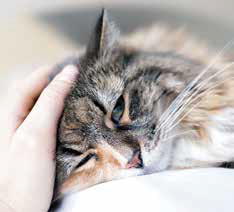Q. Our beloved gray and white tabby domestic shorthair recently died suddenly the day after receiving a clean bill of health (normal blood work and examination) and a routine rabies vaccine. We, of course, are devastated, and our veterinarian is mystified about what caused this terrible thing to happen. He suspects some sort of arrhythmia stopped Smokey’s heart, but we just don’t know. Is there anything you may be able to tell us about what may have led to our devastating loss?
A. Thank you for getting in touch, and I am so very sorry to hear of your loss. I know that this must be a very difficult time and that not knowing what caused it must make accepting it that much harder. While I cannot, unfortunately, provide you with a definitive answer, perhaps a few thoughts will help you and other cat owners.
The first thing is that the best way to determine what led to the unfortunate passing of a beloved cat is to have a necropsy (the animal form of an autopsy) performed by a board-certified veterinary pathologist as soon as possible after the passing of the pet. It is generally ideal to store remains in a refrigerated (not frozen) environment until the necropsy is performed, if possible, and you can ask your veterinarian about where they may be able to request this service.
By examining the remains and microscopic samples of tissues, combined with the use of toxicology and other specific tests, pathologists can often—but not always—determine the cause of death of a beloved pet. In some cases, no obvious cause is identified, and in these cases, the possibility of cardiac arrhythmias is always considered to be a possible cause. Animals that succumb to cardiac arrhythmias may not have any identifiable structural heart disease on necropsy, although many do.
The role of the vaccine in this unfortunate event is unclear, but vaccines are generally considered to be extremely safe and vital to maintaining feline health. In very rare cases, though, reactions to vaccines can occur in cats. The vast majority of these, though, are minor and involve localized swelling at the injection site, and perhaps some degree of fever and lethargy, but are self-limiting.
In exceedingly rare cases, cats can develop allergic-type hypersensitivity reactions to vaccines, but these most commonly occur soon after the time of vaccination and are treatable if identified early. It does not sound like this is a likely explanation for Smokey’s death.
In about one of every 10,000 vaccines given, cats can develop an aggressive type of tumor called an injection-site sarcoma, which can be very disfiguring and difficult to treat, but these occur over a much longer period of time. This is why veterinarians generally try to give the fewest number of vaccines necessary to cats, and why owners should carefully monitor injection sites in their cats and contact a veterinarian if they notice a persistant/growing lump.
In very rare cases (usually in cats that are immunosuppressed), some vaccines that use modified versions of the viruses they are designed to protect against by inducing immunity (called modified live vaccines) can cause cats to develop some signs of that viral disease. But your description does not sound like it would fit with what happened to Smokey, and rabies is a killed-virus vaccine.
It is very possible that an arrhythmia was the cause of Smokey’s demise, but I am afraid that it is likely that we will never know the true cause. I hope you can remember all the wonderful times you shared, and in doing this, you allow his spirit to live on in your heart.
Please accept our deepest condolences from all of us here at the Feline Health Center, and let us know if we can be of any further assistance.




